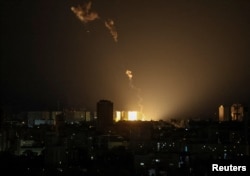New developments:
- Rome's foreign ministry issued a traveling guidance Monday, "strongly" recommending that any Italians who are still in Ukraine leave by any means. The alert on Italy's "traveling safety" website cited Monday's heavy missile attacks on Kyiv and across all Ukrainian territory. It also urged anyone going for work there to take "appropriate risk prevention and mitigation measures" and to exercise "maximum caution."
- Wagner's chief, Yevgeny Prighozin, said his fighters have started receiving ammunition from the Russian military and reported progress in Bakhmut. "Today, the groups advanced a maximum of 130 meters (400 feet) ... Fierce fighting is going on, but the groups are continuing to advance," Prigozhin said in an audio message posted on social media.
- Moscow's famed Red Square parade Tuesday on Russia's Victory Day will take place amid ramped-up security due to Russian fears of Ukrainian attacks. Many other Russian regions are canceling their V-Day celebrations as the war overshadows Russia's most important anniversary.
- Fears about the safety of Europe's largest nuclear power plant are growing after the Moscow-installed governor of the Ukrainian region where it is located ordered civilian evacuations.
- A survey published by the Democratic Initiatives Foundation on Monday shows that more than 67% of Ukrainians say the war with Russia can end only after a Ukrainian victory. Also, 82% of the respondents say there's no difference between Russian President Vladimir Putin and Adolf Hitler, leader of Nazi Germany.
In his daily video address Monday, Ukrainian President Volodymyr Zelenskyy commemorated the Allied victory over Nazi Germany in WWII and drew a parallel between the evil of Nazism then with "the current evil of ruscism."
"Today, on May 8, when the world remembers the words 'never again!' we in Ukraine give meaning to these words. Not only to remember, but also to protect," he said. "May the victory over the current evil of ruscism be the best honor to the memory of those who fought and defeated Nazism!"
The term "ruscism" was coined by Ukrainians to describe the Russian state under the current rule of President Vladmir Putin — roughly, Russian fascism.
Zelenskyy signed a bill Monday to officially mark May 8 as the Day of Remembrance and Victory over Nazism in World War II, breaking away from Russia's May 9 V-Day anniversary tradition.
Most European nations celebrate the anniversary of Germany's unconditional surrender on May 8. Russia and some former Soviet countries celebrate Victory Day on May 9, using the term the "Great Patriotic War," to stress Russia's victory over Nazi Germany.
Ukraine's Victory Day anniversary had also been the same day as Russia's, but this changed after Russia annexed Crimea in 2014.
"We will never forget the contribution of the Ukrainian people to the victory over Nazism. And we will not allow lies, as if the victory in that war could happen without the participation of any country or nation," Zelenskyy said in Monday's video.
The Ukrainian president decreed May 9 to be Europe Day instead, marking Europe's support for Ukraine in its fight against Russian aggression.
"Today, I signed the relevant decree, and every year from tomorrow, May 9, we will commemorate our historic unity — the unity of all Europeans who destroyed Nazism and will defeat ruscism," Zelenskyy said.
"This will be the Day of Europe, which helps us fight in all directions: on the battlefield with weapons and on the diplomatic front with determination against missile terror and the winter blackout, in the economy and on the legal front," Zelenskyy said. "This will be the Day of Europe — our ally. Which gives shelter to Ukrainian women and children. Which does not encroach on our sovereignty and does not call into question our right to choose our own national path."
The Ukrainian president said Monday that Russian forces in Ukraine will be defeated like Nazi Germany was defeated in World War II.
Russian attacks
Explosions were heard overnight in Kyiv, the Ukrainian capital. Kyiv Mayor Vitali Klitschko said on the messaging app Telegram that three people were wounded in blasts in Kyiv's Solomyanskyi district and two in the Sviatoshyn district, both west of the capital's center in the "biggest" exploding drone attack so far.
This was the fourth attack on Kyiv in eight days and was launched 24 hours before Russia's Victory Day anniversary.
Ukraine's First Deputy Foreign Minister Emine Dzhaparova tweeted that Ukrainian forces shot down 35 Iranian-made Shahed drones, but that debris had hit apartment buildings in Kyiv and injured five people.
In the Black Sea city of Odesa, Dzhaparova said Russian missiles hit a food warehouse and a recreation area, killing one person and injuring three others. A missile strike "completely" destroyed a Red Cross warehouse in the city, the humanitarian aid organization reported.
Russian artillery shelling also wounded eight people, including a 9-year-old boy, in two villages in Ukraine's southern region of Kherson, regional officials said.
Russia has also intensified its attacks on Bakhmut. Yevgeny Prighozin and his Wagner group continued their assault on the besieged city after the Russian military promised them more arms and ammunition.
Nuclear plant concerns
Fears about the safety of the Zaporizhzhia Nuclear Power Plant in eastern Ukraine grew Sunday after Russian officials ordered the evacuation of civilians from 18 settlements around the nuclear power plant.
The plant is near the front line of battles between Russian and Ukrainian forces. Russia fired more than 30 shells at Nikopol, a Ukrainian-held town neighboring the plant, killing a 72-year-old woman and injuring three others Sunday, according to Ukrainian authorities.
Ukraine has also mounted attacks in the vicinity of the plant, according to The Associated Press.
The head of the U.N.'s nuclear watchdog agency said in a statement Saturday the situation near the plant "is becoming increasingly unpredictable and potentially dangerous."
"I'm extremely concerned about the very real nuclear safety and security risks facing the plant," International Atomic Energy Agency chief Rafael Grossi said.
Some material in this report came from The Associated Press, Agence France-Presse and Reuters.







